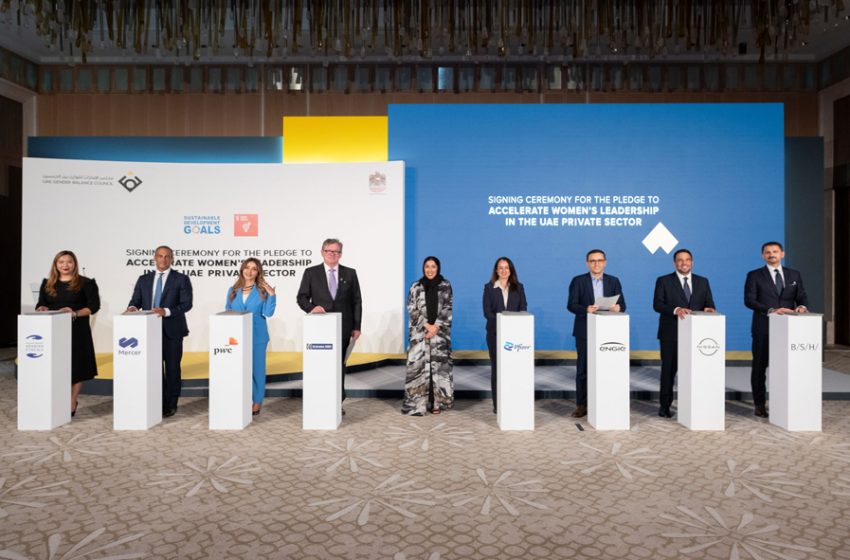Ramadan Evenings Reimagined.. A Refined Iftar Experience at Fairmont The Palm’s Fairuz Garden
Nissan Middle East commits to increasing female participation in leadership positions to 30 percent by 2025

Signing the SDG5 Pledge to Accelerate Gender Balance in the UAE Private Sector underlines Nissan’s efforts towards gender equality across its regional operations.
Dubai, UAE (31 May 2023)
In celebration of World Cultural Diversity Day this month, Nissan Middle East has solidified its ongoing dedication to diversity, equity, and inclusion (DEI) in the workplace, with a commitment to increasing the percentage of female participation in leadership roles to 30 percent by 2025. This commitment was marked by the signing of the SDG5 Pledge to Accelerate Gender Balance in the UAE Private Sector, at an event organized by the UAE Gender Balance Council.
The SDG5 Pledge to Accelerate Gender Balance in the UAE Private Sector has a target of increasing the representation of women in leadership roles to 30% by 2025 to ensure their full and effective participation at the highest levels of decision making. The pledge, established by the UAE Gender Balance Council, is in line with the fifth goal of the UN Sustainable Development Goals (SDG5) on Gender Equality, set to “Achieve gender equality and empower all women and girls”.
Signing the pledge on behalf of Nissan Middle East, Thierry Sabbagh, President, Nissan Saudi Arabia, INFINITI Middle East and Managing Director, Nissan Middle East, said: “At a global level, Nissan has long played an active role in challenging the status quo and supporting the advancement of women in the automotive sector. The UAE has been home to Nissan’s regional headquarters for almost 30 years, and we are proud to support the nation’s leadership as they continue to champion gender balance as a national priority. Signing the ‘SDG5 Pledge to Accelerate Gender Balance in the UAE Private Sector’ reaffirms our commitment to public-private partnerships in the region, while advancing our DEI efforts as we move closer to a more equitable and diverse automotive industry for all.”
With a keen focus on DEI across the organization, including its supplier base and dealer network, Nissan continues to ensure equal representation for all and supports diversity in the Middle East through a variety of methods including, training, increased maternity, and paternity leaves, and through transition coaching to aid first-time mothers return to work.
“True progress in gender equality can only come from action, and at Nissan Middle East, we strive to lead by example. This pledge reflects our aim to foster a more equitable environment for a diverse and inclusive workforce, each bringing their own unique talent and perspective. Effective allyship – at both the organizational and individual level – is crucial to empowering our female colleagues, enhancing their representation in decision-making roles, and creating more opportunities that help them advance in their careers and meet their full potential,” Sabbagh continued.
As a testament to its efforts, Nissan has seen the number of women in its workforce across the Africa, Middle East, India, Europe & Oceania (AMIEO) region, double between 2019 and 2022. By fostering a gender-equal culture, Nissan continues to set an example for the automotive industry, driving positive change and inspiring others to follow suit.
Following the signing of the pledge, Nissan participated in a roundtable discussion alongside Her Excellency Mona Al Marri, Director General of the Government of Dubai’s Media Office, and members of the UAE Gender Balance Council to discuss key topics around gender equality. The dialogue illuminated policy gaps and opportunities around gender balance in the UAE, skills needed to meet UAE economic goals, and tactics to advance public-private collaboration to achieve the UAE vision.
The SDG5 Pledge to Accelerate Gender Balance in the UAE Private Sector is built on four key pillars of equal pay and fair compensation, gender equitable recruitment and promotion, gender mainstreaming in policies and programs, and transparency through data sharing. Participating organizations commit to conducting regular gender pay gap analyses, implementing policies that support a strong work-life balance, ensuring equal opportunities, and providing a supportive and inclusive environment for all.






